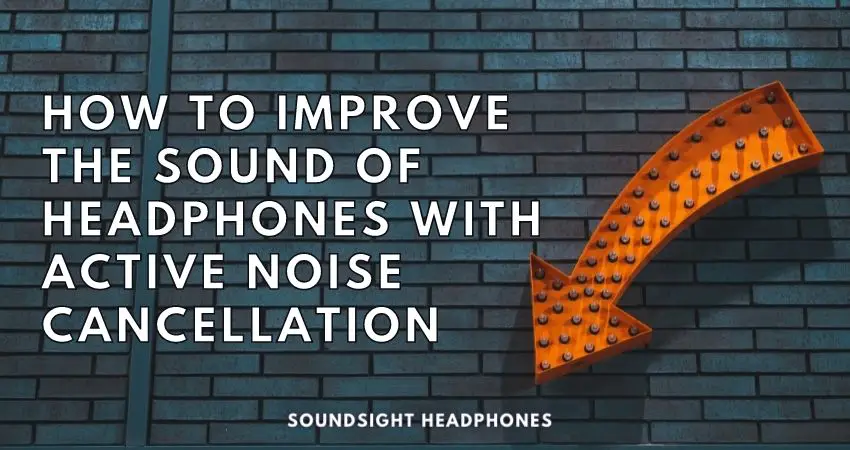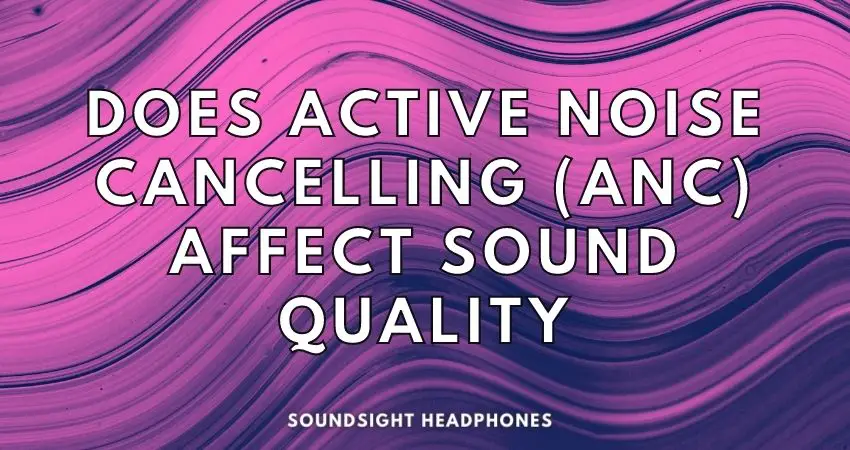Active noise canceling (ANC) headphones are growing in popularity. But, are they a good choice for you? For a fact, they will block noise around you and help you have a peaceful time. On the other hand, some users complain that the ANC interferes with sound quality.
This article will give you a deeper understanding of ANC and help you find out how ANC can affect sound quality in a way that makes the listening experience less enjoyable.
Do active noise canceling headphones affect sound quality – myth or fact?
Active noise indeed canceling, or ANC, headphones affect the listening experience by reducing ambient noise or generating subtle anti-noise waves that partially mask the actual ambient noise for the listener.
But does it affect the sound response?
The truth is: Yes, ANC has an impact on how your music is reproduced, and it’s not a myth that active noise-canceling headphones can reduce sound quality when ANC is on.
However, please note that it’s not something you’ll likely hear as a difference all the time, especially if your headsets use Feedforward ANC.
How does the ANC system affect the sound quality?
I’m not going to talk about the process and science behind ANC because I haven’t studied it. I think that is beyond the scope of this article, and someone else can do that much better than I can.
Instead, I will talk about the effects of ANC on sound quality when listening to music. And how it can make your music sound.
Here's how it works: ANC headphones can indirectly affect sound quality. The listening experience doesn't change dramatically, but subtle tweaks to sound quality can make musical parts go from “love this part” to “that seems off.”
For example, the subtle power of a kick drum beat, commonly integrated into many pop songs, can be felt and even heard when ANC is off, but it may be somewhat lost or blurred when it’s on.
Another example is when the anti-noise system is so aggressive and unrefined that the listener cannot hear parts of the music as clearly because of its impact on the low-frequency response. The low hum generated by ANC headphones causes dizziness in some people. (LINK HERE)
The muddy and uneasy bassline results in a muffled spectrum, a loss of detail, resolution, and overall quality. This is true especially in jazz and classical music, which relies heavily on instruments’ depth, texture, and sound clarity.
The harsh reality is that ANC headphones can affect the sound quality by making parts of your music go from clear, crisp, and enjoyable to dull, muffled, and lost in the mix.
This is especially true with Hybrid noise-canceling headphones, which use more electronic components and a design that’s more intended for noise-canceling effectiveness than maintaining the purity of the sound.
Why do ANC headphones impair sound quality?
The reason ANC headphones distort the sound quality is because ANC headsets use a microphone array to detect outside noise. Depending on the situation, the microphones may not pick up the noise as it is.
These are usually miniature electret microphones which, although they offer good recording quality, are small and have a large margin of error.
Because of the small pickup area, they do not always pick up sound in the same way as a large-diaphragm condenser microphone.
The sound arrives, but the microphone receives a “too loud” signal.
A slight difference between the actual sound that needs to be canceled and the anti-phase sound waves generated based on the microphone signal can cause unwanted distortion.
Other discrepancies, such as signal processing, the time it takes for the noise cancellation to work, and how we perceive sound, can cause further problems.
The range of frequencies picked up by the active microphone array may also be limited, resulting in a lack of full frequency spectrum cancellation.

How to improve the sound of headphones with active noise cancellation
Now, here are a few things that you can do to make your listening experience more enjoyable when using headphones with active noise reduction:
- Turn off the ANC when you’re not listening to music and want to hear what’s happening around you.
- If your headphones allow, lower the noise reduction intensity so that less anti-noise is generated
- Update the headset’s firmware; the current firmware version may likely have a bug that affects how microphones work and identify noises
- Avoid windy conditions; noise-canceling headphones do not work well when the wind blows into the microphones, you may find yourself with an unpleasantly rattling sound
- Listen to music genres that mask audio imperfections, such as electronic music or pop music
FAQ
Don’t ANCs distort sound in the same way that wireless headphones do?
Not at all. Active noise cancellation headphones use a “Feedforward” system to cancel the noise.
Two other noise-cancelling technologies are used with ANC headphones which affect the sound response differently. LINK HERE
Unlike wireless headphones, which play back music with a lower bit rate than wired headphones, ANC directly affects the sound response, not the quality of the audio file being played.
A simple way to tell is by playing the same frequency through headphones with ANC and without. The difference will vary depending on the loudness of the environment.
Can the active noise reduction system improve the bass in my headphones?
Frequency response measurements of some headphones with active noise cancellation show a significant increase or gain in the bass region of the headphones. The sound does not necessarily become fuller or more lively.
Those deep bass notes you see in these charts don’t correlate with the bass line of your music; they’re humming noise. These sounds are artifacts of the noise cancellation process.
This effect is partly due to the fact that active noise cancellation generates noise residue or white noise along with the noise cancellation, which often results in a slight boost in low frequencies.
What is the best type of active noise-canceling that doesn’t affect sound quality?
The most effective type of noise cancellation for listening to music is the Feedforward system. Headphones with ANC Feed-forward technology don’t affect sound quality as much as hybrid headphones. They have a microphone array to the outside world and are less likely to interfere with the music.
Check out this article on the types of active noise-cancelling technologies to see how the other two models impact your user experience. LINK HERE
Conclusion
A great listening experience is always done at home, in the comfort and quiet of one’s own room. But for those who want to take their music with them, noisy environments can make it difficult to enjoy the music.
That’s why some active noise cancelling headphones are used. They can help reduce outside noise but at the expense of sound quality.
I hope this article helped highlight how active noise-cancelling headphones affect your music, what to expect from them, and what you can do to improve the sound quality of your ANC headphones.
